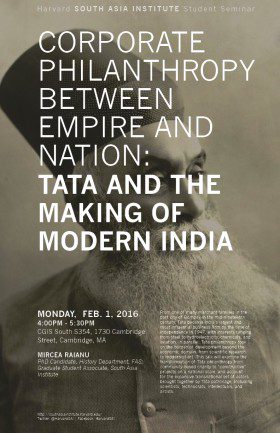Graduate Student Associate Seminar
Mircea Raianu, PhD Candidate, History Department, FAS; SAI Graduate Student Associate
Chair Sunil Amrith, Mehra Family Professor of South Asian Studies, Professor of History, Harvard Faculty of Arts and Sciences
From one of many merchant families in the port city of Bombay in the mid-nineteenth century, Tata became India’s largest and most influential business firm by the time of independence in 1947, with interests ranging from steel to hydroelectricity, chemicals, and aviation. In parallel, Tata philanthropy took on the burden of development beyond the economic domain, from scientific research to modernist art. This talk will examine the transformation of Tata philanthropy from community-based charity to “constructive” projects on a national scale, and account for the expansive transnational set of actors brought together by Tata patronage, including scientists, technocrats, intellectuals, and artists. The talk will show how the pattern of Tata philanthropic donations was neither the expression of an underlying nationalist vision, nor a purely strategic calculus. Institutions such as the Indian Institute of Science (1909), the Tata Institute of Social Sciences (1936), and the Tata Institute of Fundamental Research (1947) fulfilled the imagined developmental needs of the nation-state-in-waiting, while at the same time remaining inseparably connected to the firm’s need for technology and expertise in the mills of Bombay and the new steel township of Jamshedpur.

